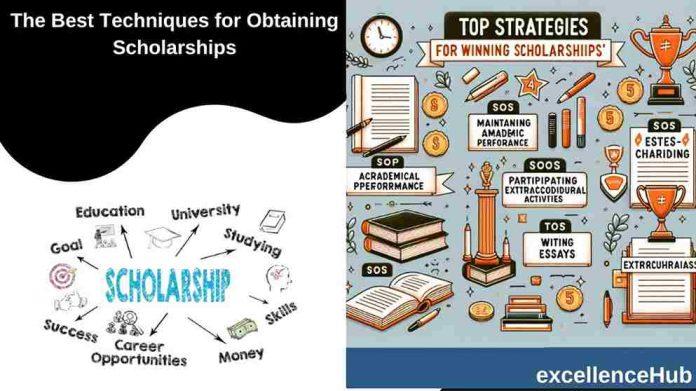Scholarships provide students with an excellent opportunity to further their education without worrying about the financial burden that often comes with it. However, competition for scholarships can be severe, with many competent individuals competing for limited monies. To stand out from the throng and boost your chances of earning a scholarship, you must first develop a sound approach. Best Techniques for Obtaining Scholarships.
In this post, we’ll look at the best tactics for securing scholarships and achieving your academic goals. From exploring scholarship opportunities to polishing your application, we will present you with helpful advice and insights to help you succeed in your scholarship pursuit. Whether you are a high school student wanting to fund your college education or a graduate student seeking financial aid for advanced studies, these tactics will help you earn scholarships. Best Techniques for Obtaining Scholarships.
Table of Contents
Researching Scholarship Opportunities
The first step toward winning scholarships is to do extensive research on available options. Scholarships are provided by a variety of institutions, including colleges, universities, non-profits, and government bodies. By researching numerous choices, you can find scholarships that match your academic goals, hobbies, and background.
One effective option to begin your research is to use online scholarship search engines such as Fastweb, Scholarships.com, and the College Board’s Scholarship Search. These systems allow you to filter scholarships by academic major, GPA requirements, and qualifying criteria. Additionally, you might inquire with your school’s guidance counsellor or financial aid office about local scholarship opportunities.
It is also critical to look for scholarships granted by professional bodies relevant to your field of study or extracurricular activities. For example, if you want to work in STEM (Science, Technology, Engineering, and Mathematics), you can look into scholarships from organizations like the National Science Foundation or the Society of Women Engineers. Best Techniques for Obtaining Scholarships.
Perfecting Your Scholarship Application
Once you’ve identified possible scholarship possibilities, the next step is to write an engaging application that successfully highlights your accomplishments and skills. Most scholarship applications include essays, letters of recommendation, transcripts or academic records, and proof of financial need.
When writing scholarship essays or personal statements, make sure to personalize your responses to the specific needs of each application. Highlight your academic accomplishments, leadership roles in extracurricular activities or community service projects, professional objectives, and aspirations.
Another component of improving your scholarship application is acquiring excellent letters of recommendation from professors, mentors, employers, or community leaders who can attest to tone mannerisms, character traits, contributions, and other attributes that make a candidate stand out. When requesting letters of reference, ensure that recommenders have enough time to develop customized, persuasive support for your application.
Furthermore, producing high-quality transcripts and academic records is critical for demonstrating accomplishment in the classroom. If any extenuating circumstances have had an influence on academic achievement, such as illness or family emergencies, consider offering context and further supporting material as needed.
Many scholarships require proof of financial need as a criterion for selection. Providing correct information about income and expenses demonstrates a real need for financing and increases the likelihood of receiving an award. Make sure to stick to deadlines and submission standards to prevent disqualification due to incomplete or erroneous information.
Networking and Building Relationships
Networking and creating contacts are important components in earning scholarships. Many organizations choose to offer funds to students who have exhibited community involvement and positively impacted society. Participating in volunteer projects, community service activities, connecting mentors and influencers, field research, engaging alumni programs, networks, building relationships, increasing awareness, possible contributors, and sponsors.
Attending networking events and conferences linked to field study is an excellent method to connect with professionals in the sector and learn about upcoming trends and advancements. Similarly, engaging in student organizations and campus leadership roles demonstrates leadership skills and the capacity to interact well with others, which are crucial attributes to consider when giving scholarships. Best Techniques for Obtaining Scholarships.
Building relationships with peers and classmates is also important since it increases the chances of discovering new scholarship options and learning effective tactics for gaining funds for school.
Apply for: Brock University Scholarships in Canada 2024
Preparing for Scholarship Interviews
- Some scholarships require applicants to go through an interview procedure as part of their selection criteria. Preparing for an interview requires demonstrating qualifications and experience to possible sponsor panel reviewers.
- Before the interview, extensively investigate the organization sponsoring the scholarship, become acquainted with its mission values, objectives, and eligibility criteria, and discuss them during the interview process.
- Practice typical interview questions. Prepare responses that express ideas clearly and simply, demonstrating communication skills and professionalism.
- Dress professionally, appear on time, and have all essential materials and documentation ready for the interviewer and panel members. Making a strong impression by displaying interest and commitment for the study goals is critical for possible sponsors to evaluate funding requests.
Thank You Notes and Follow-Ups
After submitting scholarship applications and attending interviews and events, it is critical to send thank notes, follow-ups, and express gratitude for the chance, eligibility, and continuous support for school endeavours.
- Create personalized thank you cards to specific individuals/groups that provided guidance and assistance throughout the application process, expressing gratitude for their time, resources, and professional growth.
- Follow-up emails, thank notes, and inquiries about application status updates, decisions, and prize selections ensure that you are informed of progress and potential next steps.
- Networking follow-ups encouraged build maintain relationships sponsors collaborators university representatives stay informed new funding opportunities supportive educational initiatives future endeavors.
- Remember that taking a proactive approach to financing college increases the likelihood of receiving further scholarships, grants, and fellowships to continue your study. Reducing the burden of student loan debt after graduation.
Following these top scholarship-earning strategies boosts students’ chances of getting prizes, completing their higher education goals without financial constraints, and achieving personal and professional achievement. Remember that preparation and perseverance pay off in the long run by securing necessary finances and paving the way for a better future.
Q: How can I increase my chances of receiving a scholarship?
Ans: Researching numerous scholarship options, refining application documents, and submitting high-quality applications are critical for enhancing chances of receiving rewards.
Is networking required to win scholarships?
Ans: Networking and forming connections are important components of earning numerous scholarships, showcasing community involvement, collaborating with others, raising exposure, and gaining access to new funding sources.
What ought to I do in the event that I am not awarded a scholarship?
Ans: If you are not chosen for a particular scholarship, keep looking into other opportunities, apply for them, refine your application materials, improve your qualifications, and increase the possibility that your application will be chosen in the future.


